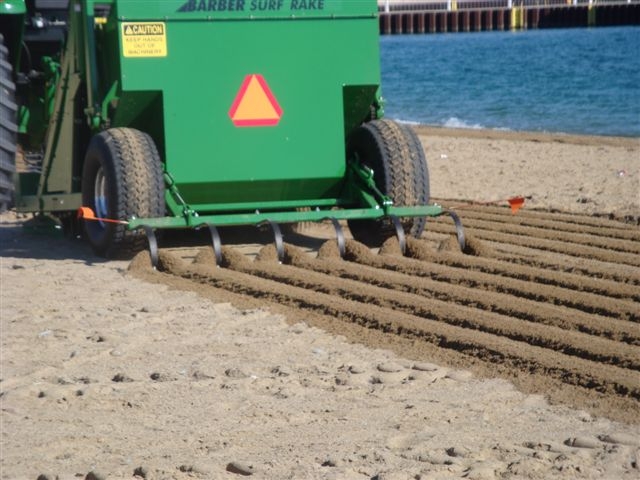Litter to …Bacteria? A look at E.Coli in Beach Sand and how Beach Cleaning Machines Can Help2/23/2012 Back in June, 2007, many studies were released that showed E.Coli was not only present in lake water, but that strong concentrations also resided in beach sand. This proved especially problematic to fresh water lakes, which are the depositories of runoff and waste-treatment overflow. Beaches found on the Great Lakes—especially Lake Michigan, Superior, and Eerie—received negative PR and multiple beach closings, which resulted in lost money and reputation. However, beach cleaner machines were ready to help and currently can be used to fight bacteria in the sand. A Little Background on E. Coli... While it is no longer a shocking discovery today, E.Coli continues to be a regular threat to lake-shore beaches and causes many beach-closings every year. E. Coli is a bacteria found in the lower intestine in warm-blooded animals. It is often not harmful. However, certain strands of the bacteria that are frequently found in Seagull, dog, and Canadian Geese feces causes moderate to severe intestinal disease in humans. Perhaps more importantly, high levels of E.Coli act as indicators for other fecal matter contamination, like salmonella . The threat from E. Coli originates not only from beach wildlife, but also comes from storm drains that funnel runoff directly into the lakes. This runoff transports dog, farm, and feedlot waste directly into lakes via the sewer system. Similarly, overflow from waste treatment plants often escapes directly into the lakes. Contaminated water then washes over the beach, where the bacteria attach to the sand. E.Coli in the sand won’t pose a threat by simply touching the skin, but it can be dangerous for small children who put their hands in their mouths after playing in the sand. In order to speed the recovery of contaminated beaches, beach cleaning machines can be used. While beach cleaners are traditionally used to remove litter and unwanted materials from the beach, they can also be used to fight microbial infections. Following the discovery of elevated E.Coli in the sand on Chicago’s beaches, the city commissioned H Barber & Sons to design a machine that would help purify their beach sand. Based on studies that revealed that prolonged sunlight and exposure to air are the best natural disablers of E.Coli in the water and sand, Barber endeavored to expose the maximum amount of sand to the sun and air as possible. It created the ‘Chicago Rake’, which is a rake that follows the SURF RAKE beach cleaner and digs 12” deep into the sand, leaving rows of raised sand in its wake. It functions by first allowing the beach cleaning machine to clean 6” deep to remove surface litter, like normal. Then the ‘Chicago Rake’ aerates the sand and increases the surface area exposed to the sun. With frequent cleaning, this increased sun/air exposure helps get the beaches’ bacteria levels back to normal levels. In the case of Chicago’s problem, the Chicago rake proved effective, and it was able to re-open its beaches to the public.
In conclusion, E.Coli and other bacteria can pose problems for beach maintenance personnel and beach goers. However, beach cleaning machines can be used to improve the beach sand conditions when applied properly. If you’re looking for more information about E.Coli on beaches, check out these helpful sites: Types of E.Coli and Potential Threat Applied Society for Microbiology article on sunlight's effectiveness for killing E.Coli in water--later related to sand applications Greening Detroit's excellent overview about E.Coli beach contamination from 2010
7 Comments
9/30/2013 07:51:21 pm
I wanted to thank you for your time that you put in and for this wonderful post.These are of great help to us . Thank you for your wonderful sharing.
Reply
10/10/2013 03:55:14 pm
Hi, Thanks for your great post, there are much nice information that I am sure a huge number of guys and gals don’t know.
Reply
5/17/2023 02:09:41 am
In 2007, studies revealed high concentrations of E.Coli in lake water and beach sand, causing beach closures and negative publicity for Great Lakes beaches. E.Coli, typically harmless, becomes problematic when certain strains from animal feces cause intestinal disease in humans. Runoff and waste overflow from storm drains and treatment plants contribute to contamination. To combat this, beach cleaning machines like the 'Chicago Rake' were designed to purify sand. These machines expose the sand to sunlight and air, effectively reducing E.Coli levels. They are valuable tools in restoring contaminated beaches and preventing microbial infections.
Reply
5/25/2023 09:35:25 pm
Dear Beach Cleaner,
Reply
6/2/2023 11:52:33 pm
This article sheds light on the persistent issue of E.Coli contamination in beach sand, particularly in freshwater lakes like the Great Lakes. The presence of this bacteria, often originating from fecal matter of animals and runoff from storm drains and waste treatment plants, poses a threat to beachgoers and leads to beach closings. However, the use of beach cleaning machines, such as the innovative 'Chicago Rake' developed by H Barber & Sons, offers a solution to purify the sand and reduce microbial infections. To learn more about beach safety and surf lessons, visit orewasurflessons.co.nz. It's crucial to prioritize the cleanliness of our beaches and safeguard the health of visitors, especially children who may unknowingly come into contact with harmful bacteria while playing in the sand.
Reply
Leave a Reply. |
This blog is managed by H. Barber & Sons. Founded in 1966, Barber is the world leader in beach cleaner production and authority on beach cleaning practices. This site and blog have been compiled to provide information about beach cleaners--their methods of cleaning, importance, and many applications.
Please direct any questions our way using the 'Contact Us' form. Thanks! Archives
June 2014
Categories
All
|

 RSS Feed
RSS Feed
